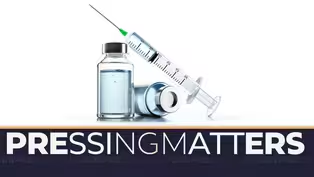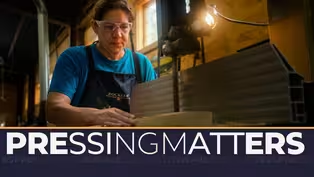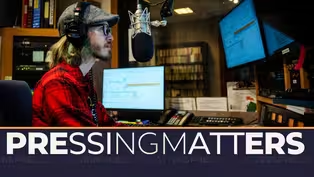Pressing Matters
Pressing Matters | Bird Flu
Clip: Season 2 Episode 3 | 4m 59sVideo has Closed Captions
Bird Flu
Herbruck Poultry Farms in Saranac suffered devastating losses in the most recent H5N1 flu outbreak that ravaged farms in Michigan and across the country. Greg Herbruck talks about what it was like watching his flock die and why is pushing for change and better protection.
Problems playing video? | Closed Captioning Feedback
Problems playing video? | Closed Captioning Feedback
Pressing Matters is a local public television program presented by WCMU
Pressing Matters
Pressing Matters | Bird Flu
Clip: Season 2 Episode 3 | 4m 59sVideo has Closed Captions
Herbruck Poultry Farms in Saranac suffered devastating losses in the most recent H5N1 flu outbreak that ravaged farms in Michigan and across the country. Greg Herbruck talks about what it was like watching his flock die and why is pushing for change and better protection.
Problems playing video? | Closed Captioning Feedback
How to Watch Pressing Matters
Pressing Matters is available to stream on pbs.org and the free PBS App, available on iPhone, Apple TV, Android TV, Android smartphones, Amazon Fire TV, Amazon Fire Tablet, Roku, Samsung Smart TV, and Vizio.
Providing Support for PBS.org
Learn Moreabout PBS online sponsorshipMeanwhile, the impact of the H5N1 virus is still being felt here and nationwide, also known as the avian or bird flu.
The ongoing outbreak has led to the mass killings of chickens, reducing the supply of eggs and driving up prices.
For Herbert's Poultry Farms headquartered in Saranac, it's been devastating.
They're one of the nation's largest producers of eggs.
We met with owner Greg, who shared with us the fallout of watching his flock die and why he's running into a lot of red tape when it comes to better protection.
- It's the worst nightmare you can imagine is when they're dying and then you've gotta go kill all the rest of 'em.
It's just the ultimate gut punch and you're just, you know, and I mean, I can't explain what it was like having the first one go, and it's a fear we have every day.
- [Jamie] As a third-generation farmer in the family poultry business, Greg Herbrook has experienced a lot.
The family has egg farms in Michigan and other states.
When H5N1 swept through their barns again last year, it wasn't the first time.
The virus has evolved a lot since being first detected in the mid-19th century.
But the current outbreak that began about four years ago was unlike anything they've dealt with.
- So you have, with a population say of a hundred thousand birds, you might lose eight to 10 a day anyway just from normal deaths.
So you're watching that very closely.
You're watching how they eat and just general health signs.
That's what our team does all day.
It was the day before Easter, they noticed in one of our flocks up the road that they had 70 dead birds.
On Sunday, they had over 700.
On Monday, it was well over 10,000.
And then you're like, oh my gosh, when's the next one?
You're not sleeping, you're coming.
And then the next one goes, the next farm.
And then, this is just that rollercoaster of emotions and we had false positive on our last farm.
And you're like, oh, okay.
Then two days later it was positive.
And so it's like, ugh, just that rollercoaster, knowing what you gotta do, which is to deal with millions of dead animals and it's just, as bad as it sounds, it is.
Some of them can go to landfills, but most of them were composted with their eggs, and the feed in the manure.
- [Jamie] The flu is still impacting birds and livestock today.
At Herbrook's, they're almost back to full capacity and growing but it came with a hefty price tag.
Millions more invested in biosecurity measures.
- We had a service team that would go out to all our sites.
Now, each site has its own.
So we basically lock down our own traffic to absolute minimum and don't let anybody else in.
So basically, if a vehicle was on another farm, it's gotta sit three days before it can come near us.
- [Jamie] How concerned are you about another future outbreak?
- I'm very concerned, but less than I was before 'cause we've put some pretty good practices and spent tens of millions of dollars in biosecurity procedures and infrastructure.
- [Jamie] Greg believes added security measures aren't enough.
He's pushing for the approval of an H5N1 vaccine.
The vaccine itself already exists, is made in the US and is being used in some foreign countries, but it hasn't been approved for use here in part because of the existing outbreak, trade, and a complicated history.
- We keep lobbying, we really need a vaccine.
We have vaccines for multiple other disease challenges and we give 'em to 'em routinely.
And this is one we've just gotta get the political will to get that over the line.
Hopefully, we get back to normal where we can have the tools to protect our hens available.
Biosecurity has proven even the hundreds of millions of dollars that egg-producing companies have invested, still getting hit.
And it just means that biosecurity alone is not the answer.
We need another tool and that is the vaccine.
So that's our hope is we can get that.
It's a chameleon.
I says it's like dealing with terrorism.
You've gotta win every day.
You know, because it's out there trying to impact.
And that's the feel you have is there's terrorists, every bird, it feels like a terrorist because it could have the virus.
Pressing Matters | Childhood Vaccines
Video has Closed Captions
Clip: S2 Ep3 | 7m 4s | Childhood Vaccines (7m 4s)
Pressing Matters | Marine Trades Institute
Video has Closed Captions
Clip: S2 Ep3 | 4m 31s | Marine Trades Institute (4m 31s)
Pressing Matters | Public Media Funding
Video has Closed Captions
Clip: S2 Ep3 | 4m 48s | Public Media Funding (4m 48s)
Providing Support for PBS.org
Learn Moreabout PBS online sponsorship
- News and Public Affairs

Top journalists deliver compelling original analysis of the hour's headlines.

- News and Public Affairs

FRONTLINE is investigative journalism that questions, explains and changes our world.












Support for PBS provided by:
Pressing Matters is a local public television program presented by WCMU


